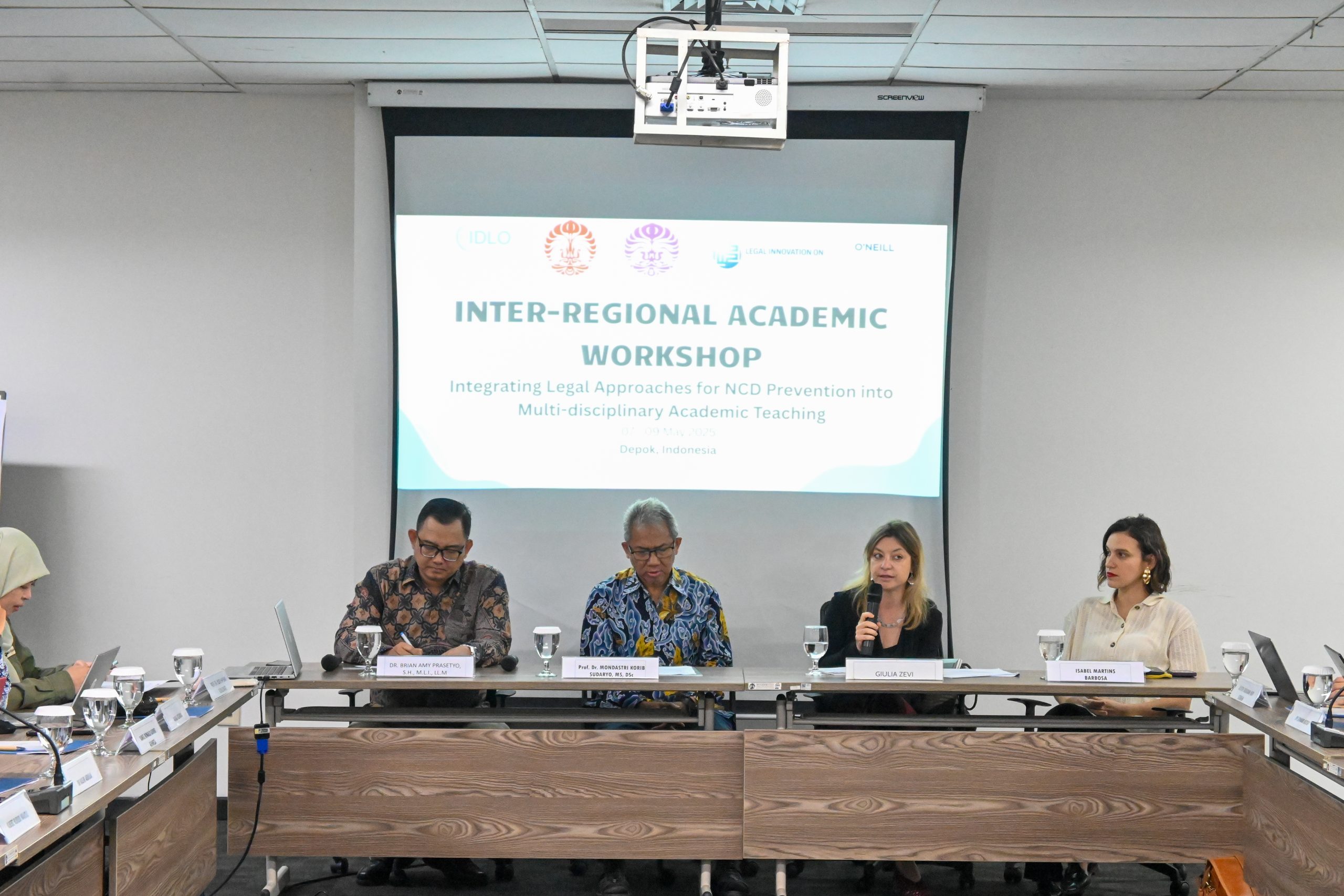Depok, May 7, 2025 – The Faculty of Public Health (FPH) Universitas Indonesia (UI), in collaboration with the International Development Law Organization (IDLO), the Faculty of Law UI (FH UI), and the Global Center for Legal Innovation on Food Environments, O’Neill Institute of Georgetown University, officially launched a three-day workshop titled “Interregional Academic Workshop on Multidisciplinary Teaching of Non-Communicable Diseases (NCD) Prevention.” The workshop took place from May 7–9, 2025, at the RIK UI campus and brought together 26 academics from 9 countries, 4 facilitators from the USA and Italy, and 2 observers from the Global Health Advocacy Incubator.
This workshop is part of the Global Regulatory and Fiscal Capacity Building Programme (Global RECAP), implemented in Bangladesh, Ghana, Indonesia, Kenya, Mauritius, Nepal, Sri Lanka, Tanzania, Thailand, and Uganda.
The workshop aimed to strengthen multidisciplinary teaching capacity and collaboration in NCD prevention, especially in African and Asian regions. It also served as a strategic platform to connect academics from law and public health fields to integrate NCD prevention topics into higher education curricula, develop interdisciplinary teaching methods, and enhance the relevance of NCD issues among students.
Dean of FPH UI, Prof. Dr. Mondastri Korib Sudaryo, M.S., D.Sc., opened the event and expressed her appreciation to IDLO, the O’Neill Institute, and FH UI for initiating the program.
“Thank you for coming and welcome to the green campus of Universitas Indonesia,” said Prof. Mondastri.
“This event is part of the interregional academic workshop in multidisciplinary teaching. As we know, food production and distribution play a crucial role in preventing and controlling non-communicable diseases (NCDs). This workshop aims to enhance participants’ capacity through a conceptual approach to NCD prevention.”
He further emphasized that the event not only provided insights but also reinforced inter-institutional collaboration.
Dr. Brian Amy Prastyo, S.H., M.L.I., LL.M., Secretary of FH UI, representing the Dean, highlighted the importance of an interdisciplinary approach in legal education.
“We strongly support the development of teaching methods that integrate legal and public health perspectives, given that NCDs are not just national concerns but global issues,” he stated.
Ms. Isabel Barbosa, Associate Director and Adjunct Professor of Law at the Global Center for Legal Innovation and Food Environments, O’Neill Institute, shared her views on the relevance of NCDs to public health.
“Strengthening and teaching NCD-related issues in public health is essential, especially through policy perspectives,” she noted, expressing enthusiasm about participating in the workshop.
“I’ve gained new insights and learned a lot about NCD issues. Thank you to everyone, especially FPH and FH UI,” she added.
Under the theme “From Macro to Micro: Situating NCD Prevention as Part of Public and Global Health,” the first day featured speakers from Southeast Asia, South Asia, West Africa, and East Africa.
Prof. Ir. Ahmad Syafiq, M.Sc., Ph.D., a Professor in the Department of Nutrition at FPH UI, explained that Southeast Asia is facing a double burden of disease, with health systems unprepared for the surge in NCD cases. Urbanization and economic development have led to lifestyle changes contributing to this rise. He emphasized the need for primary healthcare system adaptation and increased capacity for managing chronic conditions.
“Primary healthcare systems previously focused on infectious diseases are now expected to handle chronic conditions, despite challenges in workforce training and infrastructure,” Prof. Syafiq explained.
Dr. Malay Kanti Mridha (Asia) discussed the epidemiological transition in Small Island Developing States (SIDS) such as Mauritius, where communicable diseases have declined but obesity, diabetes, and hypertension have risen.
“In Mauritius, NCDs account for 85% of deaths, with a diabetes prevalence of 22%, hypertension 30%, and obesity 20–25% among adults,” he said. The government has responded with policies such as sugar taxes and the development of wellness centers.
Dr. Kasim Abdulai (West Africa) noted that his region is also seeing a rise in NCDs, with female urban obesity rates ranging from 30–62%, hypertension between 19.3–54.6%, and type 2 diabetes from 6.3–10%. He attributed this to urbanization and aging populations influencing lifestyle choices.
Similarly, Patrick Kere Maelo (Kenya) stated that the NCD burden in sub-Saharan Africa rose from 19% in 1990 to 30% in 2017.
“Diets high in sugar, salt, and fat, combined with low fruit and vegetable intake, are the main drivers,” he said. He stressed the importance of preventive and multisectoral approaches, including taxes on sugar-sweetened beverages, food advertising regulations, and promoting healthy food in schools and workplaces.
Over the three-day workshop, participants explored key topics on NCD teaching and policy.
-
Day one focused on teaching methods and basic prevention concepts.
-
Day two, themed “NCD Prevention in Practice,” covered legal and policy frameworks, regulatory interventions, and contextual approaches to industrial epidemics, including proposal writing exercises.
-
Day three featured a focus group discussion (FGD) session, during which participants designed and presented innovative curriculum proposals or learning activities developed during the workshop.
These discussions underscored the importance of cross-sector and cross-country collaboration to sustainably strengthen NCD prevention capacity. For FPH UI, the workshop was a strategic opportunity to foster innovation in interdisciplinary teaching and expand global academic collaboration—part of the faculty’s commitment to addressing future public health challenges.
(DFD)

